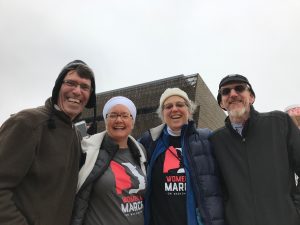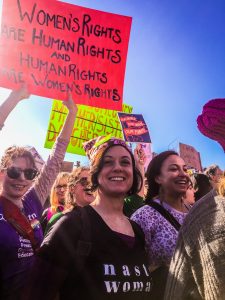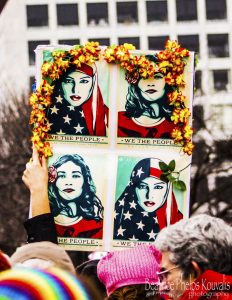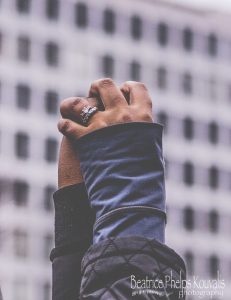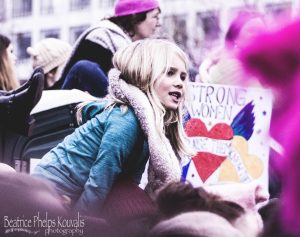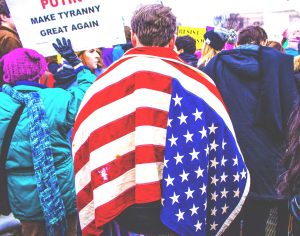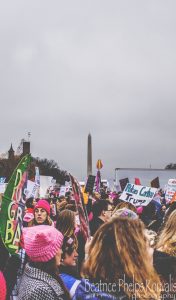This is What Democracy Looks Like
On January 21, 2017, the day after the new presidential inauguration, people marched in cities all over the country for the largest protest in the history of the United States of America and more joined around the world in organized events with the title of “Women’s March”. Students and faculty of Loyola’s Institute of Pastoral Studies marched to show the new administration that people will not back down in the face of injustice. It was the Women’s March, but we marched for so much more. We marched for all those facing the many forms of injustice including, racial, gender, and religious discrimination, violence, poverty, for the marginalized of our society, for refugees and immigrants, for access to affordable healthcare, for environmental protection, and for much more.
As a Catholic Jesuit school, we are called to be people for others, to stand up for social justice and follow in the footsteps of activists like Dr. Martin Luther King, Jr., Dorothy Day who began the Catholic Worker movement, and Jane Addams the founder of the Hull House here in Chicago, to name on a few in the long line of modern-day prophets working for justice. The signs of the march echoed the seven themes of Catholic Social Teaching: honoring the dignity of the human person, the call to family community and participation, the protection of rights and responsibilities, the preferential option for the poor and vulnerable of our society, the dignity of work and the rights of workers, the call to solidarity as one human and global family, and a call to care for God’s creation.
DukhNiwaran Kaur Khalsa (pictured center-left in the photo to the right), a pastoral counseling student at IPS, travelled to Washington DC for the march. She said of her experience, “What an empowering experience of unity in diversity! 500,000 people from all walks of life each with our own passionate agenda, standing up for the rights of ALL of us without exception. THIS is what democracy looks like!”
Kate Wester (pictured left), a pastoral counseling student at IPS, said this of her experience at the Women’s March in Chicago: “Being at the women’s march was an incredibly moving and positive experience. I saw all kinds of people coming together, peacefully to voice their vision for our country and our world. I went because I believe change will only happen from the bottom up. I want my voice to be heard, and I want to share my vision for a world without oppression that is inclusive and affirming for all people, and reverent towards our environment. Or, as a sign I saw said, ‘The patriarchy won’t smash itself!'”
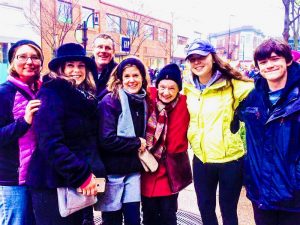 Dr. Therese Lysaught (pictured far-left) attended the Women’s March in Madison, WI. She said: “Before we left Saturday morning, news sites were estimating that approximately 10-15K people would turn out for the Women’s March in Madison. Madison turned out to be one of the biggest marches in the country with 75-100K. We were stunned by how many people were with us. We were delighted by the age range—from babies to 85 year old women, the presence of so many men, the coalition of real issues named on the signs. Seeing so many who were willing to come out, to show up, to use their bodies as well as their voices to protest what is happening gave me a huge sense of relief as well as a re-infusion of hope. It also motivated me to continue to take concrete actions to add my voice to our political process in ways that I never really have done before. I’m so glad to be at the IPS and Loyola University Chicago, surrounded by colleagues and friends to whom all these things matter as well.”
Dr. Therese Lysaught (pictured far-left) attended the Women’s March in Madison, WI. She said: “Before we left Saturday morning, news sites were estimating that approximately 10-15K people would turn out for the Women’s March in Madison. Madison turned out to be one of the biggest marches in the country with 75-100K. We were stunned by how many people were with us. We were delighted by the age range—from babies to 85 year old women, the presence of so many men, the coalition of real issues named on the signs. Seeing so many who were willing to come out, to show up, to use their bodies as well as their voices to protest what is happening gave me a huge sense of relief as well as a re-infusion of hope. It also motivated me to continue to take concrete actions to add my voice to our political process in ways that I never really have done before. I’m so glad to be at the IPS and Loyola University Chicago, surrounded by colleagues and friends to whom all these things matter as well.”
Patrice Nerone, IPS student attended the Women’s March in Chicago and said: “I joined the women’s march as a sign of my intention to be committed to myself and to the best interests of vulnerable people, to mark an end to complacency in the face of social injustice. By marching, I pledged to resist policies that I believe infringe upon our basic human rights, freedoms, and dignity. By marching, I found my voice and raised it in unison with others and for others, thereby empowering myself with the hope of empowering others.”
Women’s March on Washington 2017 from Demetri Phelps Kouvalis on Vimeo.
As a student here at IPS and a future counselor, I plan to be involved in social justice and in our community, and so I was eager to travel to Washington DC to join in the Women’s March on Washington, to listen to the stories of others marching and to be seen and counted in this effort. Marchers were friendly but passionate, angry but peaceful, and saddened yet committed to action. We heard the words of intersectional feminism and the challenge to do more for our sisters and brothers, calling our senators and being heard. It was wonderful to be surrounded by so many people fighting for what they believe. This was solidarity and love in action. It is only the beginning of the consistent work that is needed. Check out more photos of the Women’s March on Washington below.
written by Beatrice Phelps Kouvalis
See http://www.seefeellive.com for more of my photography

